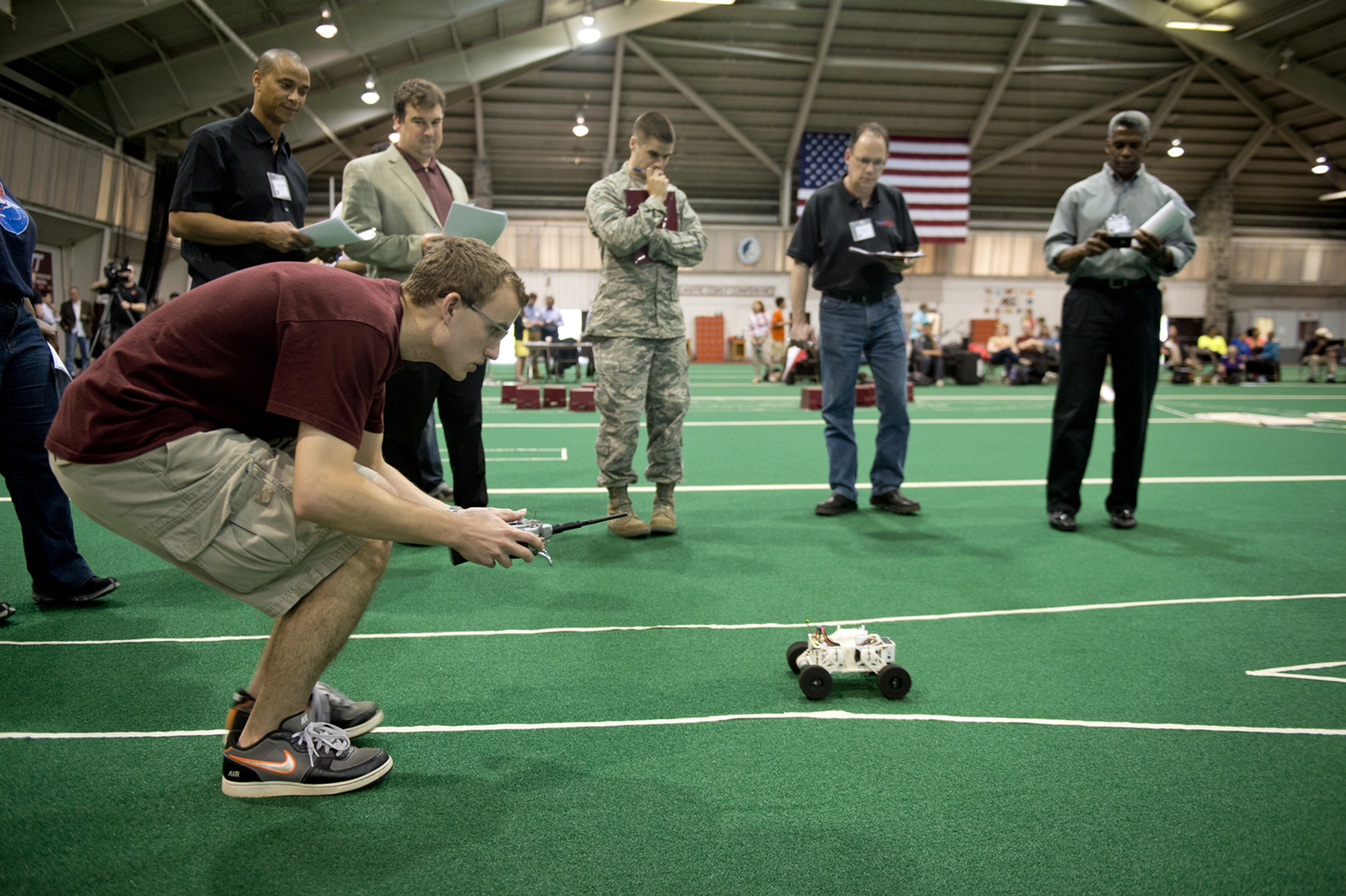Student-made 3-D printed vehicles will drive and fly at Friday competition at Rector Field House

Remotely-piloted vehicles designed, 3-D printed, and built by 12 student teams will drive and fly their way through obstacle courses at Virginia Tech's Rector Field House as part of the Friday, May 1, second annual Additive Vehicle Design Competition.
Eleven of the teams are from across Virginia Tech with members ranging from first-year undergraduates to doctoral students. The 12th team comes from the Colorado-based U.S. Air Force Academy, a new addition to the competition. The team to place first wins a $4,000 prize. A total of $15,000 in prizes is up for grabs.
The event is free and open to the public. Organizing the competition are Christopher Williams and Al Wicks, associate professors with the Virginia Tech College of Engineering’s Department of Mechanical Engineering.
“We had 205 students register for this year’s competition,” said Williams. “Similar to last year, we had freshman all the way to Ph.D. students from all over the university sign up, forming more than 80 teams. With help from an external panel of judges from federal and industrial organizations, 12 teams were selected to participate in Friday’s final competition.”
The event begins at 9 a.m. with vehicles taking on seven separate air and ground courses. After lunch, competition moves to an integrated obstacle course that combines ground and air challenges to mimic a natural disaster scenario. Here, vehicles will alternate between ground and air modes and search for “survivors” with on-bard cameras as part of a mock rescue mission, said Williams.
Last year’s inaugural Additive Vehicle Design Challenge tasked teams with building either a ground or air vehicle to participate in separate challenges. This year, Williams and Wicks raised the stakes of the challenge to meet the competition’s main goal: Spur designs that could allow future deployed military or civilian engineers to fabricate remotely-piloted vehicles while in battlefield or austere environmental conditions, such as the site of a natural disaster or to carry out reconnaissance missions, said Williams.
“Designing a vehicle that can both fly and drive is a significant challenge,” added Williams. “Having both functions makes the vehicle significantly more complex, with more on-board components such as both wheels/treads and rotor blades, more motors, more speed controllers, and bigger batteries, all of which mean more vehicle weight and more complex controls programming.”
All vehicles must be primarily 3-D printed and fit within a designated size constraint, thus mimicking an emergency rescue or military response where time is short and 3-D printing materials likely scare.
The competition is again being organized by Williams’ DREAMS – short for Design, Research, and Education for Additive Manufacturing Systems – Lab and Wicks’ Mechatronics Lab, both based in the Virginia Tech College of Engineering, and the Virginia Tech Applied Research Corporation.
The Office of the U.S. Assistant Secretary of the Army for Acquisition, Logistics, and Technology is sponsoring the event. Hardware, including vehicle base kits and cameras are being supplied by engineering firm Robotic Research. Cash prizes are coming from Stiefel Family Foundation, a nonprofit energy investment firm. Additional sponsors and supporters are Stratasys Direct Manufacturing, Electro-Mechanical Corp., Science Application International Corp., Northrop Grumman, and General Motors.
Judges – from the public and private sector – will look at vehicle design and performance, and timeliness of the student teams in finishing the obstacle courses.
With a visitor’s pass, parking is available in the Coliseum Lot located along Washington Street and Spring Road. A visitor’s pass may be obtained Monday through Friday from 8 a.m. to 5 p.m. at the Visitor Information Center, located at 965 Prices Fork Road, near the intersection of Prices Fork and University City Boulevard next to the Inn at Virginia Tech and Skelton Conference Center. A visitor’s pass may also be obtained from the Virginia Tech Police Station, located on Sterrett Drive, outside of the Visitor Information Center hours. Find more parking information online or call 540-231-3200.




